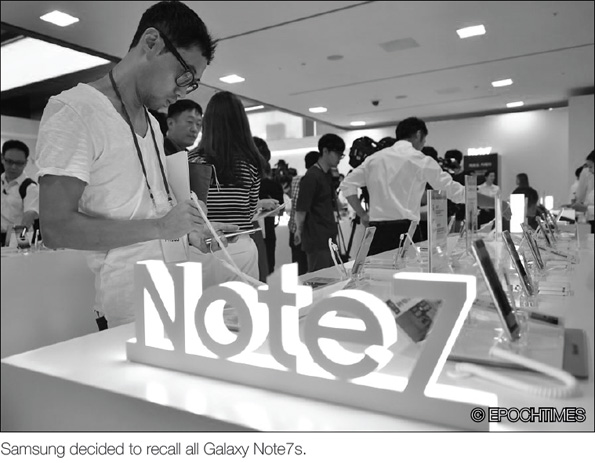
Recently, the Galaxy Note 7 was recalled because of battery explosion problems. One purchaser of the phone posted on Facebook that her Galaxy Note 7’s battery exploded. Since then, there have been some similar cases of faulty batteries. As a result, Samsung decided to recall all Galaxy Note 7s.
However, what we should focus on during this recall is that assessments from home and abroad were positive. Other companies thought highly of Samsung for exchanging all phones instead of only the batteries, which minimized the possible risks on the company’s image.
This decision could be one of the most important actions of Samsung to customers. In fact, global companies have been poor at treating customers well. They have provided unsatisfactory services in terms of dealing with problems with customers, so they have caused risks to the image of brands and have lost trust from customers.
In 2010, the iPhone4 had a problem with its antenna. If the bottom of the phone was held while calling, the signal worsened. The CEO, Steve Jobs at the time, attributed the fault to the customers’ way of holding the phone, so Apple provoked criticism from customers.
Toyota, in 2009 and 2010, made unprecedented huge recalls due to an accelerator pedal flaw. Before the decision, Toyota had covered up the problems with some excuses. However, the US government finally exposed the pedals’ problems, so they recalled all the cars. Some other companies also had issues providing poor services, such as Sony, Mitsubishi, and General Motors.
Some foreign firms in Korea sometimes have lost their reputation and trust from customers. The fake diesel gas system involving Volkswagen was one of the most shocking news items in the US in 2015. Volkswagen Korea has insisted that this accident would not be a problem in Korea because of the different environmental protection laws. However, it was revealed that Volkswagen Korea had covered up their improper business practices in car inspections and they had illegally manipulated some devices in the cars.
In another case, there was an accident where some IKEA drawers fell and killed some kids. Because of this, they recalled the drawers in the U.S. and China. However, when the Korea Consumer Agency(KCA) asked for IKEA to recall them, they didn’t listen to the complaint and kept selling the drawers in Korea. In addition to the Volkswagen and IKEA cases, Koreans have blamed foreign companies for considering Koreans as stupid customers.
A company’s attitude can influence consumers’ reactions. CBNU student, Choi Seung-jin(’15, School of Business), said, “A company’s image affects whether the consumers buy their products or not. For me, I have deep discontent with the Apple service center. There are not many service centers in Korea, and there’s only one center in Cheong-ju. I have been there before to repair my phone, but I just left the center because there were too many people who were waiting in the lines. Once I felt that they were reluctant to refurbish my phone, I felt dissatisfied with the service center.”
On the other hand, despite the difficult situations, there are some good cases of companies that turned their problems into advantages. In 1982, 8 people died from taking Tylenol, which Johnson & Johnson invented. However, in the investigation, it turned out that one guy secretly injected potassium cyanide into the Tylenol in the retail process. Even though it turned out that it was not Johnson & Johnson’s fault, they ceased producing Tylenol, and they immediately recalled all the Tylenol. As a result of this quick action, they recovered their image, and Tylenol ended up occupying about 35% of the US pharmaceutical market.
In 2007, Mattel, which is known for Barbie, had a problem with producing dolls because lead components in them exceeded the standard. The CEO, Robert Eckert, spontaneously ordered recalls and he got good comments from customers, and Mattel’s sales rose about 6% year on year.
An expert from KCA said, “When it comes to recalls, for companies, it would seem to have more losses at first, but in the long term, it could be a better choice for their image, reputation and eventual trust from customers.”
Customers’ reactions depend on how well companies treat them. If the companies try to give them better services, constant attention, and trust, they can keep a good relationship with their customers.
By Oh Byung-hyun
bh37@cbnu.ac.kr


 All
All Experience
Experience






 Oh Byung-hyun
Oh Byung-hyun











